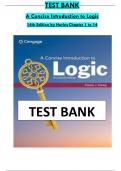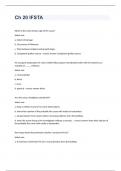Exam (elaborations)
Test Bank For A Concise Introduction to Logic 14th Edition by Patrick J. Hurley Chapter 1-14|Complete Newest Version
Course
A Concise Introduction to Logic 14th
Institution
A Concise Introduction To Logic 14th
Test Bank For A Concise Introduction to Logic 14th Edition by Patrick J. Hurley Chapter 1-14|Complete Newest Version
Test Bank for A Concise Introduction to Logic 14e 14th Edition by Patrick J. Hurley. Full Chapters test bank are included - Chapter 1 to 14 Part I: INFORMAL LOGIC. 1. Basic Concep...
[Show more]
Preview 4 out of 594 pages
Uploaded on
October 8, 2024
Number of pages
594
Written in
2024/2025
Type
Exam (elaborations)
Contains
Questions & answers
Institution
A Concise Introduction to Logic 14th
Course
A Concise Introduction to Logic 14th
$15.98
100% satisfaction guarantee
Immediately available after payment
Both online and in PDF
No strings attached
2





